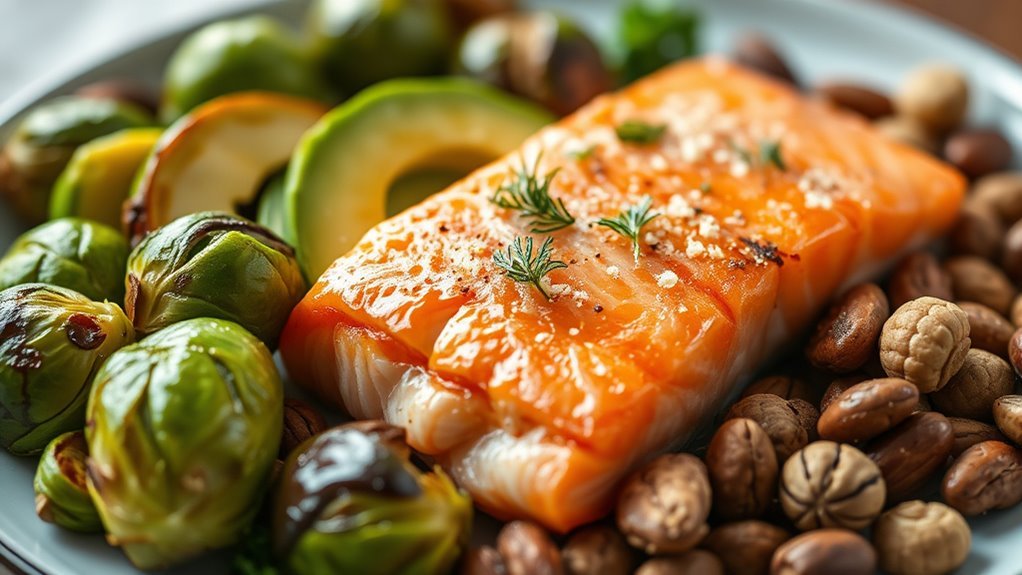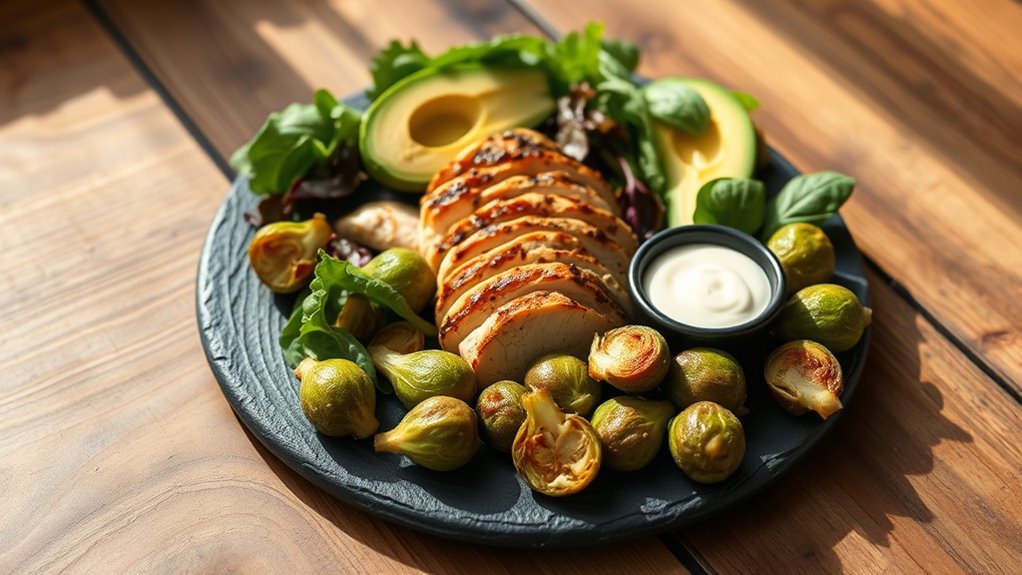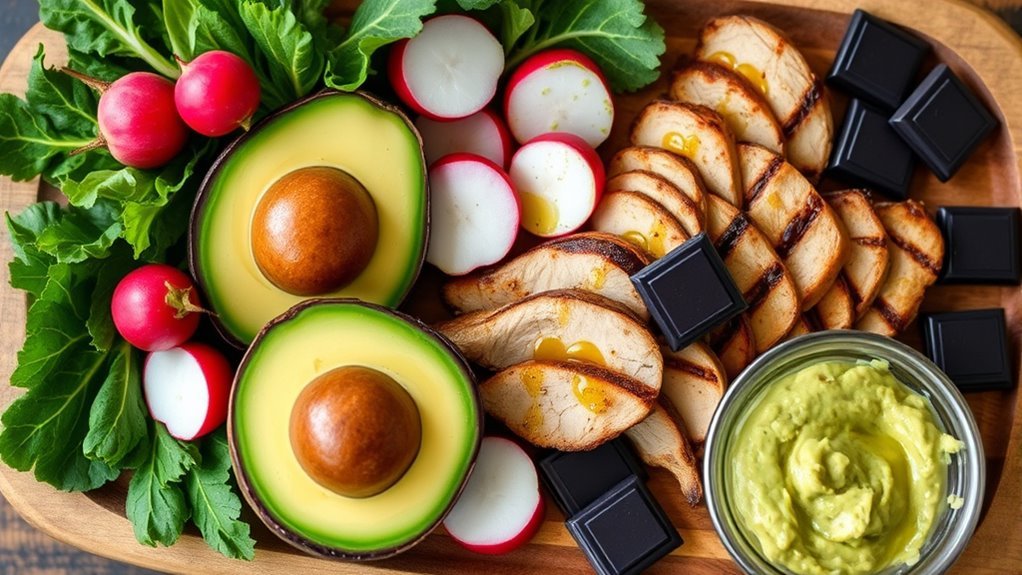The keto diet is a low-carb, high-fat eating plan that aims to shift your body into ketosis, where it burns fat for energy instead of glucose. You’ll focus on foods like avocados, leafy greens, and healthy fats, while avoiding grains, sugars, and high-carb snacks. Maintaining the right balance of nutrients is vital for success. If you’re considering trying keto or want to understand its benefits and potential risks, there’s more to explore on how to make it effective.
Understanding Ketosis

When you cut down on carbohydrates and increase your fat intake, your body enters a metabolic state known as ketosis. The ketosis definition revolves around your body shifting from using glucose as its primary energy source to utilizing fat. During the ketosis process, your liver converts fats into ketones, which serve as an alternative fuel source. This metabolic adjustment can help curb hunger and promote fat loss, making it appealing for those seeking freedom from traditional dieting restrictions. However, it’s essential to note that while ketosis can offer benefits, it’s not without challenges, such as potential side effects during the initial change. Understanding ketosis helps you make informed decisions about whether this dietary approach aligns with your health goals.
Essential Foods to Include

Achieving and maintaining ketosis requires careful attention to the foods you consume. To successfully navigate the keto diet, focus on incorporating these essential foods:
- Keto friendly vegetables: Leafy greens like spinach, kale, and broccoli are low in carbs and high in nutrients.
- Healthy fats: Opt for sources such as avocados, olive oil, and nuts to fuel your body efficiently.
- Protein sources: Include grass-fed meats, poultry, and fatty fish to support muscle mass and overall health.
- Dairy products: Full-fat cheese, yogurt, and cream can add flavor and help meet your fat intake goals.
Foods to Avoid

When following a keto diet, it’s essential to steer clear of high-carb foods, as they can hinder your body’s ability to enter ketosis. Sugary beverages and processed snacks are also best avoided, since they often contain hidden sugars and unhealthy fats that can derail your progress. By making informed choices about what to eliminate, you can better support your dietary goals.
High-Carb Foods
What high-carb foods should you steer clear of on a keto diet? To maintain ketosis, it’s essential to avoid foods that can sabotage your progress. Here are four high-carb foods to watch out for:
- Bread and Pastries – These are often packed with hidden sugars and refined carbs.
- Pasta – A classic high-carb staple that can quickly kick you out of ketosis.
- Rice and Grains – Even whole grains can be too carb-heavy for your keto goals.
- High-Carb Snacks – Many snacks, like chips and pretzels, contain hidden sugars that add up fast.
Sugary Beverages
Sugary beverages are one of the biggest pitfalls for those on a keto diet, and avoiding them can make a significant difference in your progress. These drinks are often loaded with sugar, which can quickly derail your carbohydrate intake and affect ketosis. Instead of reaching for soda or sweetened juices, consider hydration options like water, herbal teas, or sparkling water. If you crave sweetness, sugar substitutes like stevia or erythritol can be great alternatives without the carbs. Staying hydrated is essential, so focus on low-carb options that support your keto lifestyle. By making these simple changes, you’ll empower yourself and stay on track toward your goals while indulging in flavorful drinks that won’t sabotage your diet.
Processed Snacks
Processed snacks can be tempting, but they often contain hidden carbs and unhealthy ingredients that can hinder your progress on a keto diet. To maintain your keto lifestyle, it’s best to steer clear of these snacks:
- Potato chips – Most brands are high in carbs and unhealthy oils. Opt for keto friendly chips instead.
- Granola bars – While convenient, they usually pack in sugars. Look for low carb bars if you need a quick snack.
- Pretzels – These are typically made from wheat flour, which is high in carbs.
- Candy – Sugar-laden treats can sabotage your efforts; choose dark chocolate in moderation instead.
Sample Keto Meal Plan
A well-structured keto meal plan can make a significant difference in your journey toward achieving and maintaining ketosis. Here’s a sample day to inspire you:
| Meal | Options |
|---|---|
| Breakfast | Scrambled eggs with spinach |
| Lunch | Grilled chicken salad |
| Snack | Almonds or cheese slices |
| Dinner | Zucchini noodles with pesto |
Incorporating keto breakfast options like scrambled eggs fuels your day, while keto snack ideas such as almonds keep hunger at bay. This balanced approach helps maintain your energy levels and supports your dietary goals. Remember, flexibility is key—feel free to swap meals based on your preferences!
Nutritional Guidelines for Keto
While starting on a keto diet journey, understanding the nutritional guidelines is essential for success. Here are some key points to evaluate for maintaining nutrient balance and effective meal timing:
Understanding the nutritional guidelines is vital for a successful keto diet journey.
- Focus on healthy fats: Aim for 70-75% of your daily calories from fats, prioritizing sources like avocados, nuts, and olive oil.
- Moderate protein intake: Keep protein at about 20-25% of your calories, choosing quality sources like grass-fed meats and fish.
- Limit carbs: Restrict your carb intake to 5-10% of daily calories, emphasizing non-starchy vegetables for essential nutrients.
- Plan meal timing: Eat at regular intervals to stabilize energy levels and hunger, helping you stay committed to your keto goals.
Benefits of the Keto Diet
The keto diet offers several notable benefits that you might find appealing. Many people experience efficient weight loss, enhanced mental clarity, and improved energy levels when following this low-carb, high-fat approach. These advantages can make it a compelling option for those looking to optimize their health and well-being.
Weight Loss Efficiency
When considering weight loss efficiency, the keto diet stands out due to its unique approach to macronutrient intake. By focusing on high fats and low carbs, you can achieve a caloric deficit while promoting metabolic adaptation. Here are four benefits to keep in mind:
- Fat Burning: Your body enters ketosis, using fat as its primary energy source.
- Appetite Control: The high-fat content helps keep you satisfied longer, reducing cravings.
- Stable Energy Levels: With fewer carb fluctuations, your energy remains steady throughout the day.
- Simplicity: The diet’s straightforward nature makes it easier to adhere to, allowing for sustainable weight management.
Enhanced Mental Clarity
As you embrace the keto diet, you might notice an improvement in mental clarity, which many followers attribute to the brain’s preference for ketones as an energy source. This shift from glucose to ketones can enhance mental performance, making it easier to focus and think clearly. Research suggests that the reduced fluctuations in blood sugar levels on a keto diet contribute to steadier cognitive function throughout the day. Users often report experiencing heightened concentration and sharper thinking. Additionally, the anti-inflammatory effects of ketones may support overall brain health, offering long-term cognitive benefits. By prioritizing ketones, you’re not just fueling your body but also optimizing your mind, empowering you to take on daily challenges with renewed sharpness and focus.
Improved Energy Levels
While shifting to a keto diet, many individuals report noticeable improvements in energy levels. By switching your body’s primary energy sources from carbohydrates to fats, you can experience a metabolism boost that supports sustained energy throughout the day. Here are some benefits you might notice:
- Stable Blood Sugar: Reduced fluctuations in blood sugar lead to fewer energy crashes.
- Increased Fat Oxidation: Your body becomes more efficient at burning fat for fuel.
- Enhanced Physical Endurance: Many find they can perform physical activities with less fatigue.
- Improved Mental Alertness: A steady supply of ketones can lead to sharper focus and less brain fog.
Embracing the keto lifestyle may just be the freedom you need to release your full energy potential.
Potential Risks and Considerations
Although the keto diet has gained popularity for weight loss and potential health benefits, it’s important to contemplate the potential risks and considerations associated with it. One major concern is nutrient deficiencies, as cutting out entire food groups can lead to insufficient vitamins and minerals. This can affect your overall health if you’re not careful. Additionally, the long-term sustainability of the diet is uncertain; many people find it challenging to maintain such low carbohydrate intake over time. You might experience side effects like fatigue or digestive issues as your body adjusts. Before diving in, it’s wise to consult a healthcare professional to assess whether this diet aligns with your personal health goals and needs. Balance is key to any successful lifestyle change.
Frequently Asked Questions about the Keto Diet
1. What is the Keto Diet?
The Keto Diet, short for ketogenic diet, is a high-fat, low-carbohydrate dietary approach that aims to shift the body’s metabolism from burning glucose (sugar) for energy to burning fat. By drastically reducing carbohydrate intake and replacing it with fat, the body enters a metabolic state known as ketosis, where it becomes highly efficient at burning fat for energy.
2. What foods can I eat on a Keto Diet?
On a Keto Diet, you should focus on eating high-fat, low-carb foods. This includes fatty cuts of meat, fish, eggs, butter, nuts, seeds, healthy oils (like olive oil and coconut oil), avocados, and low-carb vegetables such as leafy greens, broccoli, and cauliflower. Foods high in sugar and starches, such as bread, pasta, and most fruits, are generally avoided to maintain ketosis.
3. How does the Keto Diet affect weight loss?
The Keto Diet can promote weight loss through several mechanisms. By reducing carbohydrate intake, insulin levels decrease, leading to increased fat burning. Moreover, ketosis helps suppress appetite, making it easier to consume fewer calories. Additionally, the body becomes efficient at utilizing fat for energy, which can lead to more significant fat loss over time. However, individual results may vary based on factors like metabolism and adherence to the diet.
4. Are there any side effects of the Keto Diet?
While many people may benefit from the Keto Diet, some may experience side effects, especially during the initial transition to ketosis. Common side effects include fatigue, headaches, dizziness, nausea, and irritability, often referred to as the “keto flu.” These symptoms usually subside within a few days to a week. It’s essential to stay hydrated and consider electrolyte supplementation during this phase. As always, consult a healthcare professional before starting any diet.
5. Can I stay on the Keto Diet long-term?
Many people choose to follow the Keto Diet long-term; however, it’s crucial to ensure a balanced intake of nutrients. While some individuals may thrive on a long-term keto diet, others might find it restrictive. Regular monitoring of health parameters and a consultation with a healthcare provider can help ensure that you maintain a healthy lifestyle while on the diet. Additionally, some individuals may cycle in and out of ketosis or adopt a more moderate low-carb approach for sustainability.
References
- https://en.wikipedia.org/wiki/Ketogenic_diet
- https://www.healthline.com/nutrition/ketogenic-diet-101
- https://www.ncbi.nlm.nih.gov/pmc/articles/PMC5852721/
- https://www.cdc.gov/healthyweight/healthy_eating/dietary_guidelines.html
- https://www.mayoclinic.org/healthy-lifestyle/nutrition-and-healthy-eating/expert-answers/ketogenic-diet/faq-20458830
- https://www.hsph.harvard.edu/nutritionsource/what-is-a-ketogenic-diet/
- https://www.webmd.com/diet/what-is-the-keto-diet
- https://www.nutrition.gov/topics/nutrition-education/healthy-eating/ketogenic-diet
- https://www.reuters.com/article/us-health-ketogenic-diet-idUSKBN2A428R


